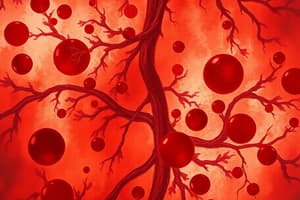Podcast
Questions and Answers
Which type of cells repair damaged blood vessels and provide growth factors for healing and repair?
Which type of cells repair damaged blood vessels and provide growth factors for healing and repair?
- White blood cells
- Red blood cells
- Platelets (correct)
- Macrophages
What is the primary function of neutrophils among all leukocytes?
What is the primary function of neutrophils among all leukocytes?
- General non-specific immunity
- Fighting parasitic worms
- Intensifying the inflammatory response
- Phagocytosis against bacteria (correct)
Leukopenia is a condition characterized by:
Leukopenia is a condition characterized by:
- Increased risk for disease
- Cancer involving an abundance of leukocytes
- Too many nonfunctional leukocytes
- Too few leukocytes being produced (correct)
Which type of white blood cell is essential in the immune response, leading to plasma cells and antibodies?
Which type of white blood cell is essential in the immune response, leading to plasma cells and antibodies?
What is the primary function of basophils among all leukocytes?
What is the primary function of basophils among all leukocytes?
What is the function of blood plasma?
What is the function of blood plasma?
What is the hematocrit percentage considered normal in blood?
What is the hematocrit percentage considered normal in blood?
Which plasma protein is responsible for transporting fatty acids and steroid hormones?
Which plasma protein is responsible for transporting fatty acids and steroid hormones?
What stimulates the production of red blood cells due to low oxygen levels?
What stimulates the production of red blood cells due to low oxygen levels?
Which type of stem cell becomes erythrocytes, platelets, granular leukocytes, or monocytes?
Which type of stem cell becomes erythrocytes, platelets, granular leukocytes, or monocytes?
What is the purpose of a bone marrow biopsy as mentioned in the text?
What is the purpose of a bone marrow biopsy as mentioned in the text?
What is the term for the cancer of masses of malignant T and B cells that collect in lymph nodes, spleen, liver, and other tissues?
What is the term for the cancer of masses of malignant T and B cells that collect in lymph nodes, spleen, liver, and other tissues?
What is the condition characterized by too few platelets and poor clotting, leading to excessive bleeding?
What is the condition characterized by too few platelets and poor clotting, leading to excessive bleeding?
What causes the formation of a blood clot of a mesh of fibrin?
What causes the formation of a blood clot of a mesh of fibrin?
Which vitamin is required by the liver for many clotting factors?
Which vitamin is required by the liver for many clotting factors?
What opposes coagulation by inhibiting the conversion of prothrombin?
What opposes coagulation by inhibiting the conversion of prothrombin?
Which disorder is characterized by deficiency of a clotting factor?
Which disorder is characterized by deficiency of a clotting factor?
What happens if a thrombus breaks free into the bloodstream?
What happens if a thrombus breaks free into the bloodstream?
Which blood type is considered the universal donor?
Which blood type is considered the universal donor?
"RBC with foreign antigens will trigger an immune response, causing RBC to clump together." This process is known as:
"RBC with foreign antigens will trigger an immune response, causing RBC to clump together." This process is known as:
"Stop blood flow following damage to a vessel, secrete growth factor for repair." This statement refers to which component of blood?
"Stop blood flow following damage to a vessel, secrete growth factor for repair." This statement refers to which component of blood?
What triggers the extrinsic pathway of coagulation?
What triggers the extrinsic pathway of coagulation?
What triggers the intrinsic pathway of coagulation?
What triggers the intrinsic pathway of coagulation?
Flashcards are hidden until you start studying
Study Notes
Blood Cells and Functions
- Endothelial cells repair damaged blood vessels and provide growth factors for healing and repair.
- Neutrophils primarily engulf and digest foreign particles and bacteria.
- Leukopenia is a condition characterized by a low white blood cell count.
Lymphocytes
- Lymphocytes are essential in the immune response, leading to plasma cells and antibodies.
Basophils
- Basophils primarily release histamine during allergic reactions.
Blood Plasma
- Blood plasma carries nutrients, hormones, gases, waste products, and proteins throughout the body.
- The normal hematocrit percentage in blood is 45-50% for males and 40-45% for females.
Lipid Transport
- Albumin is a plasma protein responsible for transporting fatty acids and steroid hormones.
Red Blood Cell Production
- Erythropoietin (EPO) stimulates the production of red blood cells due to low oxygen levels.
Stem Cells
- Pluripotent stem cells become erythrocytes, platelets, granular leukocytes, or monocytes.
Bone Marrow Biopsy
- A bone marrow biopsy is used to examine the bone marrow's cellularity, morphology, and function.
Lymphoma
- Lymphoma is a cancer of masses of malignant T and B cells that collect in lymph nodes, spleen, liver, and other tissues.
Thrombocytopenia
- Thrombocytopenia is a condition characterized by too few platelets and poor clotting, leading to excessive bleeding.
Blood Clotting
- Thrombin triggers the formation of a blood clot of a mesh of fibrin.
- Vitamin K is required by the liver for many clotting factors.
- Heparin opposes coagulation by inhibiting the conversion of prothrombin.
Hemophilia
- Hemophilia is a disorder characterized by a deficiency of a clotting factor.
Thrombus
- If a thrombus breaks free into the bloodstream, it can travel to another part of the body and cause blockage.
Blood Types
- Type O blood is considered the universal donor.
Immune Response
- Agglutination is the process of RBC with foreign antigens triggering an immune response, causing RBC to clump together.
Platelets
- Platelets stop blood flow following damage to a vessel and secrete growth factor for repair.
Coagulation Pathways
- Tissue factor triggers the extrinsic pathway of coagulation.
- Collagen triggers the intrinsic pathway of coagulation.
Studying That Suits You
Use AI to generate personalized quizzes and flashcards to suit your learning preferences.

